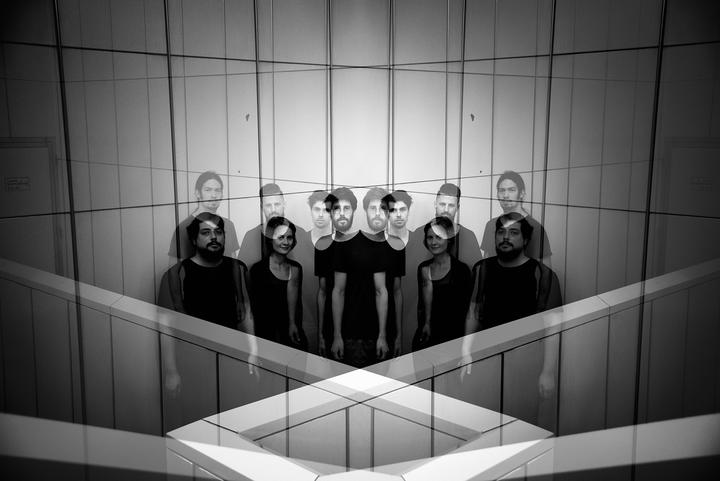Gnigler (A)
Jakob Gnigler: tenor saxophone
Philipp Harnisch: alto saxophone
Alex Kranabetter: trumpet
Simon Frick: violin
Judith Ferstl: bass
Niki Dolp: drums
We start the live-stream (real time, stream is not on demand!) about 1/2 h before the show starts. By clicking on "Now Live" a window opens, where you can watch the concert free of charge and without any registration. If you want, you can support this project with "Pay as you wish". Thank you & welcome to the (virtual) club!
Gnigler is a Viennese-based sextet headed by sax player-composer Jakob Gnigler. The sextet was founded in 2013 with the intention of wiring together idiosyncratic musical worlds into one bigger one. Straight On, Downstairs, 2nd Door Left - a typical explanation how to reach to any club in Vienna - is the sextet sophomore album after a self-titled album (Listen Closely, 2014) and realizes best Gnigler vision.
Jakob Gnigler's compositions organically blend different music worlds - contemporary music, chamber jazz, free jazz and prog-rock - without losing their strong identity or sounding too cerebral. As Jakob Gnigler stresses: “we just play, without being permanently in sway to the question of could, must and should. And the very fact that it is not trying to be something means it is everything”. He elaborates in the digital liner notes how he explores the tension between form and structure in improvisation, contrasts in tonal arrangements and synchronicity, predictable and unpredictable elements in compositions and improvisations, and how his compositions examine of the role of the individual musician-improviser in this contexts.
These profound theoretical ideas do not harm the sense of freshness, urgency and invention of Gnigler. The six young musicians - alto sax player Philipp Harnisch, trumpeter Alexander Kranabetter, electric violin player Simon Frick, double bass player Judith Ferstl, drummer Niki Dolp and Gnigler himself on the tenor sax, are well-versed in many musical worlds and all are resourceful, open and imaginative improvisers. Gnigler trusts them and encourages all to alter drastically the form of his composition throughout their solo improvisations or during the overlapping improvisations, take the lead and suggest new modules, patterns, pulse and eventually having a lasting effect on the final outcome. By emphasizing this kind of freedom, Gnigler, the sextet, do not improvise on the form but letting the improvising process shape the forms of the composition, and allowing the sextet to write its own rules anew with every new composition.
The 11 compositions of Gnigler may sound at first as meticulously, straight forms of sonic architecture but then, suddenly, they bend into puzzles or a labyrinths of pieces worlds within pieces, each one opens up its own little world. For example, the minimalist, static “eins”, where Gnigler, Harnisch and Kranabetter hold a single note for a supernaturally long time, blurs the sense of time, but when the other musicians join this texture begins to distort and sounds dirtier, disturbing. The fast, playful changes of “sechs” and “drei” brings to mind the eccentric sense of humor of Frank Zappa. The hymnal, meditative “sieben” is the most emotional piece here, shining with its serene beauty. Frick wild solo on “fünf” takes Gnigler to chaotic, fusion terrains. “Zufzanc” offers an enigmatic, but cinematic-dramatic narrative, highlighted constant shifting of leading roles. Gnigler even plays with bebop rhythmic drive on “zwei” but spirals it into fractured, almost abstract texture. (Eyal Hareuveni)
Brilliant.


